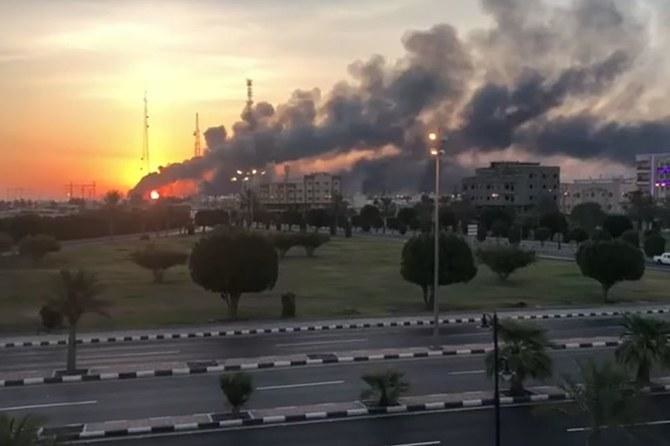WASHINGTON: The US said new evidence and analysis of weapons debris recovered from an attack on Saudi Aramco oil facilities on Sept. 14 indicates the strike likely came from the north, reinforcing its earlier assessment that Iran was behind the offensive.
In an interim report of its investigation — seen by Reuters ahead of a presentation on Thursday to the UN Security Council — Washington assessed that before hitting its targets, one of the drones traversed a location approximately 200 km (124 miles) to the northwest of the attack site.
“This, in combination with the assessed 900 kilometer maximum range of the Unmanned Aerial Vehicle (UAV), indicates with high likelihood that the attack originated north of Abqaiq,” the interim report said, referring to the location of one of the Saudi Aramco oil facilities that were hit.
It added the US had identified several similarities between the drones used in the raid and an Iranian designed and produced unmanned aircraft known as the IRN-05 UAV.
However, the report noted that the analysis of the weapons debris did not definitely reveal the origin of the strike that initially knocked out half of Saudi Arabia’s oil production.
“At this time, the US Intelligence Community has not identified any information from the recovered weapon systems used in the 14 September attacks on Saudi Arabia that definitively reveals an attack origin,” it said.
The new findings include freshly declassified information, a State Department official told Reuters.
The United States, European powers and Saudi Arabia blamed the Sept. 14 attack on Iran. Yemen’s Houthi militias claimed responsibility for the attacks, while Iran, which supports the Houthis, denied any involvement.
Reuters reported last month that Iran’s leadership approved the attacks but decided to stop short of a direct confrontation that could trigger a devastating US response. It opted instead to hit the Abqaiq and the Khurais oil plants in Saudi Arabia, according to three officials familiar with the meetings and a fourth close to Iran’s decision making.
According to the Reuters report a Middle East source, who was briefed by a country investigating the attack, said the launch site was the Ahvaz air base in southwest Iran, which is about 650 km north of Abqaiq.
Some of the craft flew over Iraq and Kuwait en route to the attack, according to a Western intelligence source cited by the report, giving Iran plausible deniability.
The 17-minute strike by 18 drones and three low-flying missiles caused a spike in oil prices, fires and damage and shut down more than 5% of global oil supply. Saudi Arabia said on Oct. 3 that it had fully restored oil output.
The US will present its findings to a closed-door session of the UN Security Council as it hopes to mobilize more support for its policy to isolate Iran and force it to the negotiating table for a new nuclear deal.
The report noted that Yemen’s Houthis “have not shown to be in possession, nor been assessed to be in possession” of the type of drones used in the attacks on the Aramco facilities.
Washington’s interim assessment also included several pictures of drone components including the engine identified by the United States as “closely resembling” or “nearly identical” to those that have been observed on other Iranian unmanned aerial vehicles.
It also provided pictures of a compass circuit board that was recovered from the attack with a marking that is likely indicating a potential manufacturing date written in the Persian calendar year, the report assessed.
The name of a company believed to be associated with Iran, SADRA, was also identified on a wiring harness label from the Sept. 14 wreckage, the report said.
US President Donald Trump last year withdrew from a 2015 nuclear deal between world powers and Iran and snapped back sanctions on Tehran with the aim of choking Iranian crude sales, the Islamic Republic’s main source of revenues.
As part of its ‘maximum pressure’ campaign, Washington has also sanctioned dozens of Iranian entities, companies and individuals in a bid to cut of Tehran’s revenue streams.

























